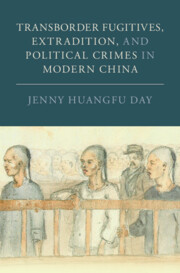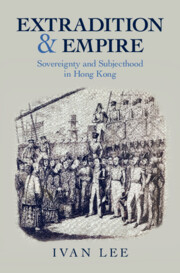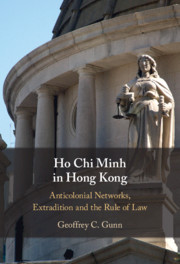Refine search
Actions for selected content:
507 results

Transborder Fugitives, Extradition, and Political Crimes in Modern China
-
- Published online:
- 10 November 2025
- Print publication:
- 30 October 2025
2 - The Origin of the “Political Offense Exception” in Sino-British Extradition
-
- Book:
- Transborder Fugitives, Extradition, and Political Crimes in Modern China
- Published online:
- 10 November 2025
- Print publication:
- 30 October 2025, pp 31-55
-
- Chapter
- Export citation
1 - Introduction
-
- Book:
- Transborder Fugitives, Extradition, and Political Crimes in Modern China
- Published online:
- 10 November 2025
- Print publication:
- 30 October 2025, pp 1-30
-
- Chapter
- Export citation
4 - Law and Justice at the Interstices of Empires
-
- Book:
- Transborder Fugitives, Extradition, and Political Crimes in Modern China
- Published online:
- 10 November 2025
- Print publication:
- 30 October 2025, pp 87-114
-
- Chapter
- Export citation
7 - Republican China’s Quest for Judicial Sovereignty and the Criminalization of Communism
-
- Book:
- Transborder Fugitives, Extradition, and Political Crimes in Modern China
- Published online:
- 10 November 2025
- Print publication:
- 30 October 2025, pp 180-209
-
- Chapter
- Export citation

Extradition and Empire
- Sovereignty and Subjecthood in Hong Kong
-
- Published online:
- 10 September 2025
- Print publication:
- 03 July 2025
Introduction
-
- Book:
- Extradition and Empire
- Published online:
- 10 September 2025
- Print publication:
- 03 July 2025, pp 1-19
-
- Chapter
- Export citation
10 - The Duty to Punish Genocide
-
- Book:
- Genocide in International Law
- Published online:
- 14 March 2025
- Print publication:
- 03 April 2025, pp 463-537
-
- Chapter
- Export citation
Chapter 17 - Hannibal’s Years of Wandering, 190–183
-
- Book:
- Hannibal and Scipio
- Published online:
- 05 September 2024
- Print publication:
- 26 September 2024, pp 369-383
-
- Chapter
- Export citation
4 - National Prosecutions of International Crimes
- from Part II - Prosecutions in National Courts
-
- Book:
- An Introduction to International Criminal Law and Procedure
- Published online:
- 07 November 2024
- Print publication:
- 18 July 2024, pp 69-88
-
- Chapter
- Export citation
5 - State Cooperation with Respect to National Proceedings
- from Part II - Prosecutions in National Courts
-
- Book:
- An Introduction to International Criminal Law and Procedure
- Published online:
- 07 November 2024
- Print publication:
- 18 July 2024, pp 89-104
-
- Chapter
- Export citation
Zabolotnyi v. Mateszalka District Court, Hungary
- United Kingdom, England. 30 April 2021
-
- Journal:
- International Law Reports / Volume 207 / 2024
- Published online by Cambridge University Press:
- 05 March 2025, pp. 445-472
- Print publication:
- 2024
-
- Article
- Export citation
General Conclusions
-
- Book:
- Between Immunity and Impunity
- Published online:
- 14 December 2023
- Print publication:
- 21 December 2023, pp 248-258
-
- Chapter
- Export citation
12 - International Criminal Law
- from Part II - The Substance of International Law
-
- Book:
- International Law
- Published online:
- 19 October 2023
- Print publication:
- 02 November 2023, pp 235-252
-
- Chapter
- Export citation
21 - Refugee Regimes
- from Part VI - Displaced Peoples and Refugees
-
-
- Book:
- The Cambridge History of Global Migrations
- Published online:
- 12 May 2023
- Print publication:
- 01 June 2023, pp 440-458
-
- Chapter
- Export citation
11 - Extradition and Surrender
- from Part IV - European Criminal Procedure
-
-
- Book:
- The Cambridge Companion to European Criminal Law
- Published online:
- 09 February 2023
- Print publication:
- 16 February 2023, pp 254-282
-
- Chapter
- Export citation
5 - Extraterritorial Jurisdiction
-
- Book:
- Fundamental Perspectives on International Law
- Published online:
- 23 November 2022
- Print publication:
- 15 December 2022, pp 261-302
-
- Chapter
- Export citation
23 - Law Enforcement and Judicial Co-operation in Criminal Matters
- from Part VIII - Judicial Co-operation
-
-
- Book:
- The Law and Practice of the Ireland-Northern Ireland Protocol
- Published online:
- 20 January 2022
- Print publication:
- 03 February 2022, pp 285-295
-
- Chapter
-
- You have access
- Open access
- HTML
- Export citation
6 - Legal Process
-
- Book:
- Ho Chi Minh in Hong Kong
- Published online:
- 19 July 2021
- Print publication:
- 29 July 2021, pp 151-171
-
- Chapter
- Export citation

Ho Chi Minh in Hong Kong
-
- Published online:
- 19 July 2021
- Print publication:
- 29 July 2021
